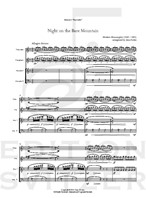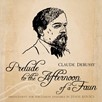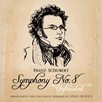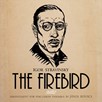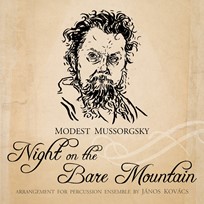
Night on the Bare Mountain
Composer: Modest Mussorgsky
Instrument: Percussion Ensemble
Level: Advanced
Published: 2014
Price: €40.00
Item details
-
Description +
-
Arranged by János Kovács
Duration: 30 min.
Night on the Bare Mountain is a tone poem written by Russian composer Modest Mussorgsky in 1867.
Mussorgsky (1839-1881) was an innovator of the Romantic period but had a troubled life and died early, not leaving many works behind. He proved to be very influential on later Russian pioneers such as Sergei Prokofiev and Dmitri Shostakovich, thus shaping the history of modern music.
Night on the Bare Mountain started out as several early projects that Mussorgsky worked on and abandoned, first an opera, then a work for piano and orchestra that centered mainly on the theme of witches’ sabbath, a notion that by the 19th century had turned from taboo to romantic fascination. Among Mussorgsky’s inspirations were Russian folk legends, pagan Midsummer festivities, Nikolai Gogol's short story St. John's Eve, and a play called The Witch by Georgiy Mengden.
Later on Mussorgsky crystallized the work into its final form, a striking tone poem of very descriptive, almost visual quality. It illustrates a witches’ gathering taking place on St. John's Night (or Midsummer) on the Lysa Hora (or Bald Mountain), which is an actual place near Kiev. The witches engage in ritualistic dance and summon Satan, who arrives and sits on a throne while being sung praises to. The sabbath escalates into a shuddersome frenzy and ends in a dissonant crash.
The piece was never performed during Mussorgsky’s lifetime but became famous in the form of an orchestration that Nikolai Rimsky-Korsakov wrote in 1886. Rimsky-Korsakov revised and made changes to the initial score, most importantly toning down its savage energy and giving it a positive and hopeful ending where dawn and church bells scare the witches and demons away. Mussorgsky’s original score was rediscovered in the 1920’s, but it was Rimsky-Korsakov’s version that endured. It gained a new wave of popularity when it was featured in the 1940 Disney animated film Fantasia.
Well into the 21st century, Night on the Bare Mountain still surprises with its modern, visually compelling, almost horror movie-like character.
Amália Kovács
Târgu Mures, January 2014
-
-
Instrumentation +
-
Percussion Ensemble:
1 Xylorimba (or Xylophone)
1 Vibraphone
2 Marimbas
-
-
About the composer +
-
Modest Petrovich Mussorgsky (21 March [O.S. 9 March] 1839 – 28 March [O.S. 16 March] 1881) was a Russian composer, one of the group known as "The Five". He was an innovator of Russian music in the romantic period. He strove to achieve a uniquely Russian musical identity, often in deliberate defiance of the established conventions of Western music.
Many of his works were inspired by Russian history, Russian folklore, and other nationalist themes. Such works include the opera Boris Godunov, the orchestral tone poem Night on Bald Mountain and the piano suite Pictures at an Exhibition.
For many years Mussorgsky's works were mainly known in versions revised or completed by other composers. Many of his most important compositions have posthumously come into their own in their original forms, and some of the original scores are now also available.
-
-
Reviews +
-
Review (Percussive Notes, July 2016)
Percussion ensemble programs normally feature contemporary music styles, but often include an arrangement or transcription of music that was originally written for other instruments. The arranger of this ensemble has been writing a series of works that fit this format, and this setting of the famous Mussorgsky piece is presented as a keyboard quartet. All of the parts can be performed with two-mallet technique.
True to the Mussorgsky original, the arrangement moves through several key changes, including 1 flat, 3 sharps, 5 flats, and 2 sharps. The parts are well written, and capture the mood and energy of this well-known work. The work will take around 12 to 15 minutes to perform.
Even if one opts to use this as a teaching tool, students will benefit greatly from learning this piece.
—George Frock
-
-
Credits +
-
Front Cover graphics and layout: Amália Kovács
Engraving: János Kovács & Johan Svitzer
Preface: Amália Kovács
Translation: Amália Kovács
Printed in Copenhagen, Denmark
Copyright © Edition SVITZER
www.editionsvitzer.com
-
